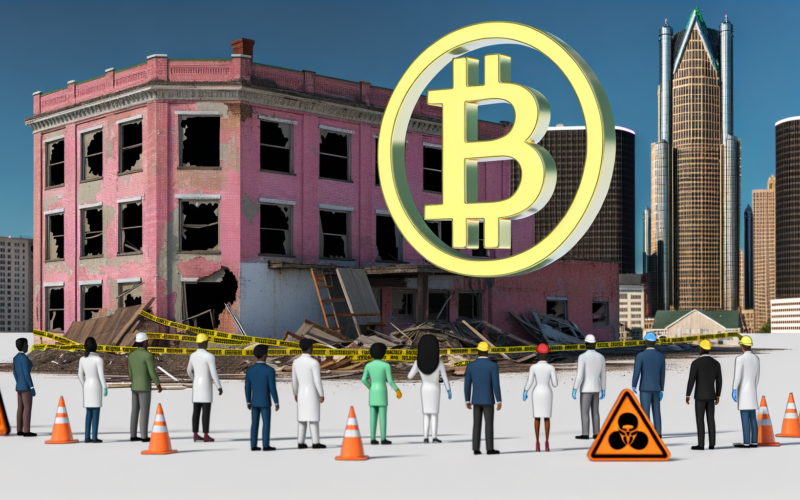Detroit sues crypto real estate startup RealToken for neglecting property safety. Tenants face dire conditions. #RealEstate #Crypto #DetroitLegalAction
- Introduction: Unmasking RealToken’s Impact on Detroit’s Housing Crisis
- The Historical Context of Real Estate Tokenization: From Concept to Controversy
- Main Insights on RealToken’s Operational Shortcomings: An In-Depth Analysis
- Challenges in the Crypto Real Estate Market: Navigating Uncharted Waters
- Future Outlook: The Evolving Landscape of Crypto Real Estate
- Final Reflections on Crypto Real Estate: Lessons and Insights
Introduction: Unmasking RealToken’s Impact on Detroit’s Housing Crisis
In an unexpected twist of events, the city of Detroit has found itself embroiled in a legal skirmish with RealToken LLC, a cryptocurrency-based real estate platform. This lawsuit not only marks a significant moment in the intersection of blockchain technology and urban housing but also highlights pressing concerns about safety and ethical responsibilities in property management. As Detroit takes a stand against RealToken, it raises the question: How do crypto platforms impact real-world communities? This article delves into the intricacies of the lawsuit, the implications for real estate tokenization, and what this means for the future of urban housing.
The Historical Context of Real Estate Tokenization: From Concept to Controversy
Real estate tokenization emerged as a revolutionary concept within the blockchain ecosystem, promising to democratize property investment and enhance liquidity in an otherwise illiquid market. The idea was simple yet powerful: by converting real estate assets into tokens, multiple investors could own shares of a property, much like stocks. This innovation was hailed as a game-changer, potentially opening doors for more inclusive financial participation.
However, the journey from concept to implementation has not been without its hurdles. RealToken LLC positioned itself as a pioneer in this space, claiming to offer unprecedented returns through its Ethereum-based platform. As the company expanded its portfolio, acquiring numerous properties in Detroit, the promise of high yields attracted a diverse range of investors. Yet, behind the scenes, the reality for tenants was starkly different, leading to the current legal battle.
Main Insights on RealToken’s Operational Shortcomings: An In-Depth Analysis
Tokenization and the Promise of Profit: A Closer Look
At the heart of RealToken’s business model is the concept of fractional ownership via cryptocurrency. By tokenizing real estate, the platform allowed investors to purchase fractions of properties, allegedly offering returns as high as 16%. This model, while innovative, has come under scrutiny as the lawsuit reveals a darker side: properties in severe disrepair, posing health and safety risks to tenants.
Tenant Experiences: Living in the Shadow of Neglect
The lawsuit details shocking living conditions, including properties lacking basic amenities such as heat and running water. Tenants report enduring unsafe environments, with some living without a functioning shower for over two years. These conditions, allegedly ignored by RealToken despite legal obligations, highlight a significant gap between investor promises and tenant realities.
The Role of Blockchain: Transparency vs. Responsibility
Blockchain technology is often lauded for its transparency and security. However, the RealToken case suggests that technological oversight does not automatically ensure ethical responsibility. The platform’s focus on investor returns seemingly overshadowed its duty to maintain safe living conditions, questioning the ethical frameworks governing such innovations.
Regulatory Challenges: Bridging the Gap Between Innovation and Compliance
One of the primary challenges in the crypto real estate market is navigating regulatory landscapes that are often ill-equipped to deal with rapid technological advancements. The RealToken case underscores the need for clear guidelines to ensure platforms adhere to safety and health standards while fulfilling investor expectations.
Balancing Investor Interests and Tenant Welfare: A Delicate Dance
The dual pressure of satisfying investor demands and maintaining property standards presents a complex challenge for tokenization platforms. RealToken’s alleged failure to manage this balance has resulted in legal repercussions, serving as a cautionary tale for similar ventures.
Technological Limitations and Ethical Considerations
While blockchain offers enhanced transparency, it does not inherently address ethical considerations. The RealToken lawsuit highlights the importance of developing ethical frameworks that prioritize tenant welfare alongside technological advancements.
Future Outlook: The Evolving Landscape of Crypto Real Estate
Emerging Trends and Predictions: What Lies Ahead
As the crypto real estate market continues to evolve, the RealToken lawsuit may serve as a pivotal moment, prompting a reevaluation of regulatory measures. Future trends may include stricter compliance requirements and increased scrutiny on the ethical practices of tokenization platforms.
Opportunities for Innovation: Leveraging Technology for Good
Despite current challenges, the potential for blockchain to positively impact real estate remains significant. By addressing existing shortcomings, such as tenant welfare and regulatory compliance, the industry can harness technology to create more equitable and sustainable housing solutions.
Final Reflections on Crypto Real Estate: Lessons and Insights
The Detroit-RealToken lawsuit is a stark reminder of the complexities at the intersection of technology, investment, and community welfare. As we reflect on this case, it becomes clear that the future of crypto real estate hinges on the industry’s ability to balance innovation with ethical responsibility. By learning from these challenges and prioritizing both investor and tenant interests, the sector can pave the way for a more inclusive and sustainable real estate landscape. As stakeholders navigate these turbulent waters, the lessons from Detroit may well serve as a guiding light for the future.
This comprehensive exploration sheds light on the multifaceted impacts of RealToken’s operations in Detroit, emphasizing the need for a balanced approach to innovation and ethical responsibility in the crypto real estate market.











